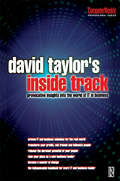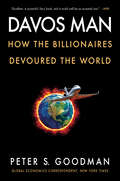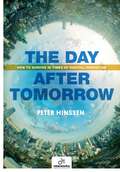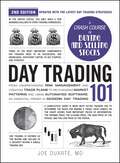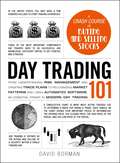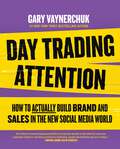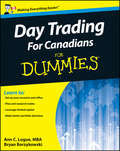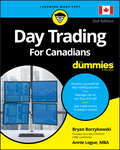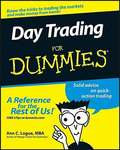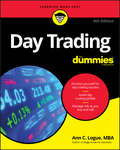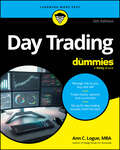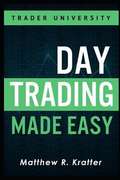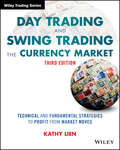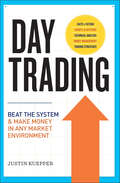- Table View
- List View
David Neeleman: Flight Path of a Servant Leader (A)
by William W. George Matthew D. BreitfelderDavid Neeleman, founder of JetBlue, is forced to confront a crisis in customer confidence following operational difficulties on February 14, 2007. This becomes a vital test of his leadership.
David Neeleman: Flight Path of a Servant Leader (B)
by William W. George Matthew D. BreitfelderDavid Neeleman (B) traces the events subsequent to the (A) case.
David Ricardo
by John E. KingThis book offers a new account of David Ricardo's political economy that is both scholarly and accessible. It provides a detailed overview of the secondary literature on Ricardo down to 2012, and discusses alternative perspectives on his work, including those of Marxians, neoclassicals and Sraffians.
David Ricardo. An Intellectual Biography (Routledge Studies in the History of Economics)
by Sergio CremaschiDavid Ricardo has been acclaimed – or vilified – for merits he would never have dreamt of, or sins for which he was entirely innocent. Entrenched mythology labels him as a utilitarian economist, an enemy of the working class, an impractical theorist, a scientist with ‘no philosophy at all’ and the author of a formalist methodological revolution. Exploring a middle ground between theory and biography, this book explores the formative intellectual encounters of a man who came to economic studies via other experiences, thus bridging the gap between the historical Ricardo and the economist’s Ricardo. The chapters undertake a thorough analysis of Ricardo’s writings in their context, asking who was speaking, what audience was being addressed, with what communicative intentions, using what kind of lexicon and communicative conventions, and starting with what shared knowledge. The work opens in presenting the different religious communities with which Ricardo was in touch. It goes on to describe his education in the leading science of the time – geology – before he turned to the study of political economy. Another chapter discusses five ‘philosophers’ – students of logic, ethics and politics – with whom he was in touch. From correspondence, manuscripts and publications, the closing chapters reconstruct, firstly, Ricardo's ideas on scientific method, the limits of the 'abstract science’ and its application, and, secondly, his ideas on ethics and politics and their impact on strategies for improving the condition of the working class. This book sheds new light on Ricardian economics, providing an invaluable service to readers of economic methodology, philosophy of economics, the history of economic thought, political thought and philosophy.
David Taylor's Inside Track: Provocative Insights into the World of IT in Business (Computer Weekly Professional Ser.)
by David TaylorNever before has IT played such a significant role in transforming organisations, of all sizes. And yet it continues to be dominated by technical jargon, acronyms and irrelevant detail. This book cuts through all of the confusion, and presents a clear, direct, solution based focus on the key IT/business issues facing every company and business leader today.This book contains the complete, first fifteen months of David Taylor's highly acclaimed Computer Weekly column - Inside Track. With a reputation for cutting through the hype, David focuses on the IT/business and personal leadership agenda, covering such issues as:* The key IT issues for the boardroom - in business language* Actions to win in the new world of e-commerce - and get started today* The successful new IT leader - the skills you and your company need toemploy* Quick solutions to long-term IT problems - they can be resolved* How to motivate your people, and slash staff turnover - save a fortune onrecruitment costs* True IT/business alignment - add real value to your bottom lineDavid Taylor is a leading authority on IT in business. He is President of the association of IT Directors, Certus, a reference partner to the UK Government's National Audit Office, and a registered expert with several global research companies. His overall aim is to enable people and organisations to be all that they can be, through the combination of world class technology, true leadership and the release of human potential. With a prestigious background across companies such as Rolls-Royce, Allianz and Cornhill, David has a driving, positive passion for IT in business, and a reputation for championing IT Directors who want to achieve board level positions in their organisations. David and his team work with FTSE 200 companies on winning in the new internet economy, with entrepreneurs starting new dot com ventures, and with CEOs, advising on the qualities they should seek in their IT leaders. A regular writer, television presenter and speaker, David gives keynote, leadership and IT presentations throughout the world. He lives with his wife, Rosalind and their two children, Anthony and Olivia, in Surrey.
David Yin's Vegetarian Mission
by Boris Groysberg Evan M S HechtAfter the establishment of his critically-acclaimed upscale vegetarian restaurant, King's Joy, in Bejing, chef and entrepreneur David Jin must decide whether or not to expand to other locations or continue to invest in his existing location in order to fulfill his mission of promoting vegetarian cuisine.
Davos Man: How the Billionaires Devoured the World
by Peter S. GoodmanFrom the New York Times’s Global Economics Correspondent, a masterwork of explanatory journalism that exposes how billionaires’ systematic plunder of the world—brazenly accelerated during the pandemic—has transformed 21st-century life and dangerously destabilized democracy. "Davos Man will be read a hundred years from now as a warning. ... Deliciously rich with searing detail, the clarity is reminiscent of Tom Wolfe." —EVAN OSNOSThe history of the last half century in America, Europe, and other major economies is in large part the story of wealth flowing upward. The most affluent people emerged from capitalism's triumph in the Cold War to loot the peace, depriving governments of the resources needed to serve their people, and leaving them tragically unprepared for the worst pandemic in a century.Drawing on decades of experience covering the global economy, award-winning journalist Peter S. Goodman profiles five representative "Davos Men"–members of the billionaire class–chronicling how their shocking exploitation of the global pandemic has hastened a fifty-year trend of wealth centralization. Alongside this reporting, Goodman delivers textured portraits of those caught in Davos Man’s wake, including a former steelworker in the American Midwest, a Bangladeshi migrant in Qatar, a Seattle doctor on the front lines of the fight against COVID, blue-collar workers in the tenements of Buenos Aires, an African immigrant in Sweden, a textile manufacturer in Italy, an Amazon warehouse employee in New York City, and more.Goodman’s rollicking and revelatory exposé of the global billionaire class reveals their hidden impact on nearly every aspect of modern society: widening wealth inequality, the rise of anti-democratic nationalism, the shrinking opportunity to earn a livable wage, the vulnerabilities of our health-care systems, access to affordable housing, unequal taxation, and even the quality of the shirt on your back. Meticulously reported yet compulsively readable, Davos Man is an essential read for anyone concerned about economic justice, the capacity of societies to grapple with their greatest challenges, and the sanctity of representative government.
Dawn of the E-Lance Economy
by Thomas W. Malone Robert J. LaubacherIn this eye-opening article, Thomas W. Malone and Robert J. Laubacher of the Massachusetts Institute of Technology look at how a new kind of organization could form the basis of a new kind of economy--an e-lance economy--where all the old rules of business are overturned and big companies are rendered obsolete. Drawing on their research at MIT's Initiative on Inventing the Organizations of the 21st Century, the authors postulate a world in which business is not controlled through a stable chain of management in a large, permanent company. Rather, it is carried out autonomously by independent contractors connected through personal computers and electronic networks. These electronically connected freelancers--e-lancers--would join together into fluid and temporary networks to produce and sell goods and services. When the job is done--after a day, a month, a year--the network would dissolve and its members would again become independent agents. Far from being a wild hypothesis, the e-lance economy is, in many ways, already upon us. We see it in the rise of outsourcing and telecommuting, in the increasing importance within corporations of ad-hoc project teams, and in the evolution of the Internet. Most of the necessary building blocks of this type of business organization--efficient networks, data interchange standards, groupware, electronic currency, venture capital micromarkets--are either in place or under development. What is lagging behind is our imagination. But, the authors contend, it is important to consider sooner rather than later the profound implications of how such an e-lance economy might work. They examine the opportunities, and the problems, that may arise and anticipate how the role of managers may change fundamentally--or possibly even disappear altogether.
Day After Tomorrow: How to Survive in Times of Radical Innovation
by Peter HinssenPeter Hinssen's radical long-term view on organizing and innovation is as fascinating as it is insightful. This is a great read about the future of business, aimed at those who want to witness the potential of this age of disruption. Adam Pisoni, CEO at Abl Schools, Co-founder of Responsive.org and Co-founder of Yammer. "Peter Hinssen has done it again! The Day After Tomorrow is a provocative and inspiring book that will challenge you, educate you and open your eyes to possibilities that you never thought existed. A must-read for any organization that wants to prepare for disruptive changes." Costas Markides, Professor of Strategy and Entrepreneurship at London Business School. "Many futurists entice us with fanciful notions. Peter Hinssen, however, manages the impossible, combining a stunning clear vision of the future with a compelling but concrete framework to act on now." Eddie Obeng, Professor at Pentacle The Virtual Business School For today s organizations, our exponentially changing world has come with great consequences. In this book, Peter Hinssen tells the story of the pioneers who managed to adapt to those changes and who moved beyond today and even tomorrow in their approach to innovation. In doing so, they were able to change the course of entire industries. Peter's book focuses on the business models of these pioneers, on the organizational culture, the talent, the mindset and the technology we should tap into in order to maximize our chances for survival in the 'Day After Tomorrow'. It will shift your perspective on your future, on the future or your company and even that of your grandchildren.
Day One Trader
by Joe Morgan John Sussex"The catastrophic events of 2008 prove that the financial world has not learnt the lessons of my own tragic tale. But anyone who thinks that the world of derivatives is just about greedy bankers who put our pensions and savings at risk is wrong. Day One Trader is the gripping chronicle ofthe unknown working heroes of the Liffe floor who shattered a glass ceiling of elitism in the City of London and helped build one of the few financial institutions that we can be proud of."--Nick Leeson"As I walked into the members entrance of the exchange for the first time on September 30 1982 I felt a buzz of excitement. I had realised my ambition of being a "day-one trader". Inside, the fluorescent lit exchange floor bustled with about three hundred traders in orange, red and blue jackets. A brief opening ceremony was overseen by Gordon Richardson, the governor of the Bank of England, before he cut a white ribbon hanging above a pulpit overlooking the floor. I felt at fever pitch as we counted down the start of trading. "Ten, nine, eight, seven, six, five, four, three, two, one!" The bell rang and I watched a scrum of dealers scramble to trade Liffe's first ever contracts in a heap of frenetic energy."--From Day One TraderDay One Trader is the exclusive story of John Sussex on his journey from son of a Basildon factory worker, leaving school at 16, to successful City financier and member of the Liffe board.Providing a unique insight to this competitive and often brutal industry, readers will discover the tactics used by dealers to survive the jungle of the pits in a story that chronicles the floor banter and characters that made Liffe a global derivatives powerhouse.Packed full of exclusive - until now unreported - stories, Day One Trader sheds new light on what motivated characters such as Nick Leeson, and provides insight to Liffe floors star traders.Financial experts and novices alike will be gripped by Sussex's account of the highs and lows of a career that spanned almost three decades in the history of the financial markets."John Sussex lived by the mantra of My Word is My Bond. This makes Day One Trader a must read for all traders. Every page brings back a lifetime of trading memories of days that will never be the same."--David Barnett, Global Head of Treasury, Royal Bank of Canada"Day One Trader describes a journey through a world that came and went in too short a time. The Liffe floor challenged the status quo in the City of London in the early eighties and was itself killed off by technology in the late nineties. John Sussex was one of the great characters of that world and a man of the utmost integrity."--Richard Berliand J.P. Morgan, Chairman Futures & Options
Day Spa & More
by Entrepreneur MagazineAre you ready to take the plunge and start your own spa? Now's the perfect time. Spas have become one of the fastest-growing industries around the globe. Whether you're interested in day spas, medical spas, spiritual spas, yoga centers or another variety, the expert advice in this guide helps you get started today.Learn all the business information you need to succeed--from choosing a location to setting prices to attracting new clients.Plus, get the hottest trends in the spa industry and expert advice on the creative elements that turn an ordinary spa into an extraordinary relaxation center.Researching the marketIdentifying a niche and attracting a target audienceCreating the right atmosphere to enhance the spa experienceOffering the hottest spa servicesHiring talented and trustworthy employees25 marketing tactics under $50And more!Pick up this guide to get started and succeed in this fun , profitable, and rewarding business.The First Three YearsIn addition to industry specific information, you'll also tap into Entrepreneur's more than 30 years of small business expertise via the 2nd section of the guide - Start Your Own Business. SYOB offers critical startup essentials and a current, comprehensive view of what it takes to survive the crucial first three years, giving your exactly what you need to survive and succeed. Plus, you'll get advice and insight from experts and practicing entrepreneurs, all offering common-sense approaches and solutions to a wide range of challenges. Pin point your target market Uncover creative financing for startup and growth Use online resources to streamline your business plan Learn the secrets of successful marketing Discover digital and social media tools and how to use them Take advantage of hundreds of resources Receive vital forms, worksheets and checklists From startup to retirement, millions of entrepreneurs and small business owners have trusted Entrepreneur to point them in the right direction. We'll teach you the secrets of the winners, and give you exactly what you need to lay the groundwork for success.BONUS: Entrepreneur's Startup Resource Kit!Every small business is unique. Therefore, it's essential to have tools that are customizable depending on your business's needs. That's why with Entrepreneur is also offering you access to our Startup Resource Kit. Get instant access to thousands of business letters, sales letters, sample documents and more - all at your fingertips!You'll find the following:The Small Business Legal ToolkitWhen your business dreams go from idea to reality, you're suddenly faced with laws and regulations governing nearly every move you make. Learn how to stay in compliance and protect your business from legal action. In this essential toolkit, you'll get answers to the "how do I get started?" questions every business owner faces along with a thorough understanding of the legal and tax requirements of your business.Sample Business Letters1000+ customizable business letters covering each type of written business communication you're likelyto encounter as you communicate with customers, suppliers, employees, and others. Plus a complete guide to business communication that covers every question you may have about developing your own business communication style.Sample Sales LettersThe experts at Entrepreneur have compliled more than 1000 of the most effective sales letters covering introductions, prospecting, setting up appointments, cover letters, proposal letters, the all-important follow-up letter and letters covering all aspects of sales operations to help you make the sale, generate new customers and huge profits.
Day Trade Online
by Farrell Christopher A.Day trading can be quite lucrative, but only if you know what you are doing. As Farrell points out: "Trading for a living is hard. Trading for a living over the Internet is even harder. There are many challenges and obstacles that confront you. Venturing into this jungle unprepared is a recipe for disaster. " This straightforward guide provides the head start and heads up necessary to thrive as a day trader, covering everything from the dangers and pitfalls of trading online to an in-depth analysis of which trading techniques work and which don't. Day Trade Online, Second Edition presents inside information on the strategies of top trading firms, including the most secretive, misunderstood, and profitable function on Wall Street. Most importantly, you will learn to look at ten different stocks and pinpoint which one to trade, when, at what price, and why. With the right know-how, you will be able to apply this knowledge to every single stock that you screen.
Day Trading 101, 2nd Edition: From Understanding Risk Management and Creating Trade Plans to Recognizing Market Patterns and Using Automated Software, an Essential Primer in Modern Day Trading (Adams 101 Series)
by Joe DuarteAn updated and refreshed guide to day trading, with prescriptive information and actionable advice to help you achieve financial success.It may seem that day trading is only for savvy investors who know the ins and outs of the marketplace—but it doesn&’t have to be. All it takes is the right information and staying on top of the market. Day Trading 101, 2nd Edition, simplifies all the terms, strategies, and processes involved in day trading, helping even the most novice investor find financial success. With updated information on trading patterns, mastering trading options, keeping tabs on the market, establishing strategies to make the most profit, and understanding trading lingo, this guide can get you on track to becoming a smart investor. Full of expert advice on the best paths to trading success, Day Trading 101 leaves no stone unturned, and no trading option undiscovered.
Day Trading 101: From Understanding Risk Management and Creating Trade Plans to Recognizing Market Patterns and Using Automated Software, an Essential Primer in Modern Day Trading (Adams 101)
by David BormanA comprehensive guide to day trading, with prescriptive information and actionable advice to help you achieve financial success.It may seem that day trading is only for savvy investors who know the ins and outs of the marketplace—but it doesn’t have to be. All it takes is the right information and staying on top of the market. Day Trading 101 simplifies all the terms, strategies, and processes involved in day trading, helping even the most novice investor find financial success. With information on recognizing trading patters, mastering trading options, keeping tabs on the market, establishing strategies to make the most profit, and understanding trading lingo, this guide can get you on track to becoming a smart investor. Full of expert advice on the best paths to trading success, Day Trading 101 leaves no stone unturned, and no trading option undiscovered.
Day Trading Attention: How to Actually Build Brand and Sales in the New Social Media World
by Gary Vaynerchuk“One thing I've learned being around Gary for the last decade is that when he sees new consumer trends or new best practices in marketing, people should listen and act on them.” — Michael Rubin, CEO of Fanatics In his seventh business book, bestselling author, entrepreneur, and investor Gary Vaynerchuk offers fresh, in-depth advice to enhance brand development, grow sales, and beat the competition using modern advertising strategies grounded in social media.In his 2013 bestseller Jab, Jab, Jab, Right Hook, Gary Vaynerchuk showed the world how to create winning content for underpriced attention channels. But since then, new platforms have emerged, others have become less relevant, and algorithms are incentivizing new styles of content. New skills are necessary to create advertising that builds brand and sales.In his latest book, Vaynerchuk argues that today’s fast-growing businesses, brands, content creators, and influencers have one thing in common: They mastered storytelling in areas of underpriced attention, which predominantly exists across a handful of social media platforms. Informed by 20+ years of business and marketing success, he contends that the biggest transformation and opportunity is the “TikTokification of Social Media.” Increasingly, platforms are distributing content based on what users are interested in, rather than who they follow. In Day Trading Attention, Gary offers detailed advice on how small businesses, large corporations, and creators can:Understand attention—what it is, where it is, where it’s underpriced, and how to leverage itProduce relevant, strategic content Use modern advertising platforms to build brand and grow sales in today’s rapidly changing environment
Day Trading For Canadians For Dummies
by Ann C. Logue Bryan BorzykowskiDay Trading For Canadians For Dummies provides anyone interested in this quick-action trading for income with the nuts and bolts information and advice and, most importantly, a step-by-step plan of action for getting started in the day trading market. It includes information on the ins and outs of day trading; understanding the short-term markets; and raising capital and protecting one's principal investment. It also helps readers understand how to manage risk and keep emotions in check, as well as provide sample trading plans. This Canadian edition features information on the best online brokerage firms, offers helpful Canadian resources, and covers the unique tax issues Canadian traders have to face.
Day Trading For Canadians For Dummies
by Ann C. Logue Bryan BorzykowskiPurchase the power to trade smart Knowledge is power in any endeavor, and in the quick-action world of day trading—with roller-coaster markets, trade wars, and new tax laws inflating both opportunity and risk—being expertly informed is what gives you the power to trade fast with a cool head. The fully updated new edition of Day Trading For Canadians For Dummies—the first in almost a decade—gives you that knowledge, taking you from the basic machinery of short-term markets to building and sticking to a plan of action that keeps your bottom line sitting pretty. In an easy-to-follow, no-jargon style, award-winning business journalist Bryan Borzykowski provides a complete course in day trading. He covers the basics—such as raising capital and protecting one’s principal investments—as well as specialized skills and knowledge, including risk-management strategies and ways to keep your emotions in check when you’re plugged into an overheating market. You’ll also find sample trading plans and important Canada-specific information, such as the best online brokerage firms, useful local resources, and an overview of the unique tax issues faced by Canadian traders. Evaluate strategy and performance Read market indicators Know your crypto Get your options For day traders, every second counts: With the help of Day Trading For Canadians For Dummies, you’ll know where you want to be and how to get there—and how best to profit—fast.
Day Trading For Dummies
by Ann C. LogueIn an ever-changing market, get the advantage of trading for yourselfDay trading is undoubtedly the most exciting way to make your own money. Before you begin, you need three things: patience, nerves of steel, and a well-thumbed copy of Day Trading For Dummies.This plain-English guide shows you how day trading works, identifies its all-too-numerous pitfalls, and gets you started with an action plan. From classic and renegade strategies to the nitty-gritty of daily trading practices, it gives you the knowledge and confidence you'll need to keep a cool head, manage risk, and make decisions instantly as you buy and sell your positions.Expanded coverage of day trading resources and sites availableHelp choosing an online broker in the current marketNew trading productsUpdated information on SEC rules and regulations (and tax laws)New investment optionsUpdated examples that reflect current market and economic conditionsRead Day Trading For Dummies and get the tips, guidance, and solid foundation you need to succeed in this thrilling, lucrative, and rewarding career!
Day Trading For Dummies
by Ann C. LogueUnderstand how day trading works—and get an action plan Due to the fluctuating economy, trade wars, and new tax laws, the risks and opportunities for day traders are changing. Now, more than ever, trading can be intimidating due to the different methods and strategies of traders on Wall Street. Day Trading For Dummies provides anyone interested in this quick-action trading with the information they need to get started and maintain their assets. From classic and renegade strategies to the nitty-gritty of daily trading practices, this book gives you the knowledge and confidence you'll need to keep a cool head, manage risk, and make decisions instantly as you buy and sell your positions. New trading products such as cryptocurrencies Updated information on SEC rules and regulations and tax laws Using options to manage risk and make money Expanded information on programming If you’re someone who needs to know a lot about day trading in a short amount of time, this is your place to start.
Day Trading For Dummies
by Ann C. LogueConquer the markets and become a successful day trader Day trading is a fast-paced, sometimes risky form of investment. Day Trading For Dummies gives you the information you need to get started with this quick-action form of trading for income and maintain your assets. Learn how the market works, how to read and predict price movements, and how to minimize your loss potential, so you can manage your money strategically and create your day trading plan. Expert author Ann Logue will set you on the path to success, showing you the techniques successful day traders use to profit. This new edition covers crypto, AI, meme stocks, new trading options, and the latest strategies. By following market indicators and doing the essential research, you can avoid making critical mistakes and instead make smart trades that earn money. Learn the basics of how the stock market works and master the concepts specific to day trading Understand the risks involved in fast-paced day trading and maximize your profit potential without going broke Discover new methods and ideas, including cryptocurrency trading and FOMO risk Earn income and get tips for minimizing your tax bill at the end of the yearDay Trading For Dummies will teach you a lot about day trading in only a little time. Beginning to intermediate investors will love this jargon-free guide to deciding if day trading is for you and making the best money you can.
Day Trading Made Easy: A Simple Strategy For Day Trading Stocks
by Matthew KratterThis is exactly the book that I wish I'd had when I was first learning how to day trade stocks. <p><p> In this book, you will learn: <p> How to take advantage of big traders to put money in your pocket <p> How to find the best stocks for day trading <p> The one thing you must never do when day trading <p> Where to set your stop loss and profit target for the day <p> How to short stocks using the Day Sniper strategy <p> How to avoid the pattern day trader rule <p> And much, much more!
Day Trading Stocks The Wall Street Way: A Proprietary Method For Intra-day And Swing Trading
by Josh DiPietroDay Trading Stocks the Wall Street Way: A Proprietary Disclosure on Intra-Day Trading and Swing Trading Equities provides a real-world guide to successful day trading, and gives you the tools, techniques, and tested, reliable methods you need to trade like the pros. Written by a seventeen-year day trading veteran, this guide talks you down from the industry hype to give you a realistic grounding in self-discipline, consistency, and patience while teaching you the hard skills you need to have a real chance of success. <p><p> Avoid losses by swerving from the typical beginner's path of seminars, software, and major brokerage houses, and instead develop the insights that lead to real, long-term profits. With an engaging and humorous tone, the author relates his own experiences and lessons learned to teach you the do's, the don'ts, and the ingredients for success. You'll discover Josh DiPietro's FUSION TRADING SYSTEM—a proven method developed from years of reliability testing. He'll show you how intra-day setups and swing trading setups can be merged to develop a perfect trade. <p> The surest path to failure and tremendous financial loss begins with the over-eager, overly optimistic amateur trader who sees day trading as a quick and easy path to wealth. This book gives you a much more realistic outlook, and the fundamentals you need to make the most of the market. <p> A poorly defined trading approach will cost you more money than you will make, rendering your day trading venture a potentially damaging net loss. Day Trading Stocks the Wall Street Way: A Proprietary Disclosure on Intra-Day Trading and Swing Trading Equities teaches you the avoidance of loss, the discipline, and the transparent strategies of success, so you can play the market to win.
Day Trading Stocks the Wall Street Way: A Proprietary Method For Intra-Day and Swing Trading (Wiley Trading)
by Josh DiPietroAvoid bogus trading systems, learn from a real day trader, and make consistent profits day trading stocks Day Trading Stocks the Wall Street Way: A Proprietary Disclosure on Intra-Day Trading and Swing Trading Equities provides a real-world guide to successful day trading, and gives you the tools, techniques, and tested, reliable methods you need to trade like the pros. Written by a seventeen-year day trading veteran, this guide talks you down from the industry hype to give you a realistic grounding in self-discipline, consistency, and patience while teaching you the hard skills you need to have a real chance of success. Avoid losses by swerving from the typical beginner's path of seminars, software, and major brokerage houses, and instead develop the insights that lead to real, long-term profits. With an engaging and humorous tone, the author relates his own experiences and lessons learned to teach you the do's, the don'ts, and the ingredients for success. You'll discover Josh DiPietro's FUSION TRADING SYSTEM—a proven method developed from years of reliability testing. He'll show you how intra-day setups and swing trading setups can be merged to develop a perfect trade. The surest path to failure and tremendous financial loss begins with the over-eager, overly optimistic amateur trader who sees day trading as a quick and easy path to wealth. This book gives you a much more realistic outlook, and the fundamentals you need to make the most of the market. Get an honest perspective on real-world day trading Gain the wisdom of experience and avoid common pitfalls Learn the framework to Josh Dipietro's profitable FUSION TRADING SYSTEM A poorly defined trading approach will cost you more money than you will make, rendering your day trading venture a potentially damaging net loss. Day Trading Stocks the Wall Street Way: A Proprietary Disclosure on Intra-Day Trading and Swing Trading Equities teaches you the avoidance of loss, the discipline, and the transparent strategies of success, so you can play the market to win.
Day Trading and Swing Trading the Currency Market
by Kathy LienDiscover a variety of technical and fundamental profit-making strategies for trading the currency market with the Second Edition of Day Trading and Swing Trading the Currency Market. In this book, Kathy Lien-Director of Currency Research for one of the most popular Forex providers in the world-describes everything from time-tested technical and fundamental strategies you can use to compete with bank traders to a host of more fundamentally-oriented strategies involving intermarket relationships, interest rate differentials, option volatility, news events, and central bank intervention.
Day Trading: Beat the System and Make Money in Any Market Environment
by Justin KuepperAll You'll Ever Need to Trade from Home When most people hear the term "day trader," they imagine the stock market floor packed with people yelling 'Buy' and 'Sell' - or someone who went for broke and ended up just that. These days, investing isn't just for the brilliant or the desperate—it's a smart and necessary move to ensure financial wellbeing. To the newcomer, day trading can be a confusing process: where do you begin, and how can you approach trading in a careful yet effective way? With Day Trading you'll get the basics, then: Learn the Truth About Trading Understand The Psychology of Trading Master Charting and Pattern-recognition Study Trading Options Establish Trading Strategies & Money Management Day Trading will let you make the most out of the free market from the comfort of your own computer.



